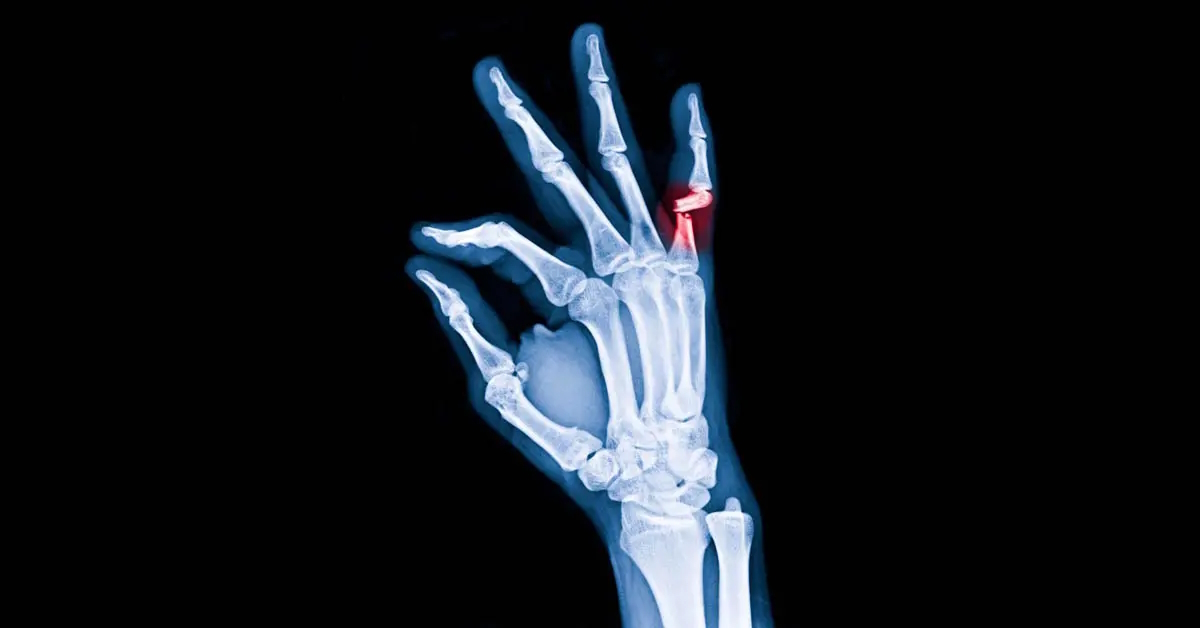Billy* has never broken a bone or been injured in his life. He always came away without a single scratch, no matter what sport he played or what precarious spot he put his body in over the years. That’s why it was so shocking when he suffered a broken finger from accidentally slamming his left hand in a kitchen drawer while making breakfast. He felt a pop in the middle of his ring finger the second the heavy drawer closed, though he kept telling himself that the injury wasn’t that bad and would get better with lots of ice and a homemade splint. Sadly, it didn’t. In fact, the swelling and pain intensified. It was then that he admitted begrudgingly, “I think I have a broken finger.”
Having a broken finger is no fun. But you’re certainly not alone. Finger fractures are the most common fractures among upper extremity injuries, more so than a broken arm, hand, or shoulder. They affect patients of all ages—regardless of whether you are young and active like Billy or an older adult who enjoys quietly gardening on the weekdays—and may cause impaired hand function and disability due to pain and stiffness. Broken finger treatment may only require a cast, but severe cases can be too unstable and require pins, screws, or plates.
Most of us think of extreme cases where there is an obvious deformity or bone protruding. We also think of intense pain. But a break or crack doesn’t have to be very big for you to have a broken finger. You may not have any pain.
Signs of a Possible Broken Finger
- Severe pain in the hands, fingers, or thumb
- The affected finger is bent in an unnatural position
- Significant tenderness and bruising
- Inability to move or difficulties moving the affected finger
- Mild to severe deformities
- Inflammation and stiffness
- Clicking or grinding sounds when you move your finger
- Numbness and tingling
- Pain that radiates into the hand
- General weakness
What Happens After a Broken Finger?
Immediately after the injury, you may wonder, like Billy did, if you merely have a sprain or strain rather than a broken finger. Yes, that is a possibility. A sprain is the partial tearing or overstretching of finger ligaments. Meanwhile, strains are the overstretching and tearing of muscles and tendons, such as when you bend your finger too far backward (hyperextension) or the wrong way. Both are very common injuries and have symptoms that overlap with those experienced in fractures and breaks. But more often than not, your broken finger will be obvious.

Beyond the signs mentioned above, most people hear a pop, snap, or crack upon injury. This is usually because of sudden impact or trauma (smacking your finger on a solid object, landing on your hand, slamming your finger in a drawer or door, crushing injury, etc.). They also experience severe pain that only increases with movement.
Is it possible to have a broken finger and not experience some or all these symptoms? Absolutely. According to the American Society for Surgery of the Hand, the number of combinations of types and severity of hand fractures is infinite. The break could be tiny. Your individual pain tolerance may also not lead to any immediate symptoms. But that doesn’t change the fact that you have a broken finger. This is where proper diagnosis is so critical.
The ASSH has a specific list of fracture variations that can occur with a broken finger:
- A stable fracture is when the bone pieces are still aligned even after a break.
- An unstable fracture is when there are bone fragments that have shifted.
- A comminuted fracture is when the bone is shattered into many pieces.
- An open or compound fracture is when a bone fragment breaks through the skin.
Who Is at Risk for a Broken Finger?
Anyone is at risk for a broken finger. As previously mentioned, athletes and people who work with their hands for a living are usually the most at risk. Also, older people with weak bones due to calcium deficiency have an increased risk of fracture. But freak accidents happen to everyday people all the time. After all, we use our hands, fingers, wrists, and forearms for everything—writing, typing, tying our shoes, driving, grabbing an item from the pantry, shaking someone’s hand, or lifting weights in the gym. At some point, a broken finger or other issue can make performing these and other daily tasks difficult, if not impossible.

Most people quickly clutch the affected finger and hand after a broken finger incident because touching, pressing, or moving the finger is excruciating. A slight deformity could exist and swelling and bruising set in immediately. Delays in diagnosis will complicate broken finger treatment, repair, and recovery. What may have started as mild discomfort could lead to persistent pain, decreased range of motion, a reliance on daily over-the-counter medications, and the inability to do the things you love the most. These complications are only magnified if you truly have a broken finger.
If a bone fracture is left untreated, the bone cannot heal and could lead to any of the following:
- Permanent deformity and instability
- Long-term joint issues
- Serious infections
- Damage to blood vessels, nerves, and other tissues
- Muscle and ligament damage
- Chronic pain that doesn’t improve over time
- Osteoarthritis
- More complicated and invasive corrective surgery
How Is a Broken Finger Treated?
The first step is to visit an orthopedic surgeon with experience dealing with hand, finger, wrist, and shoulder injuries. It is possible that you don’t have a broken finger at all. Still, these professionals can provide an immediate diagnosis through manual exams and X-rays.
Depending on the type of fracture you’ve suffered, broken finger treatment may only require a splint or cast to stabilize the fracture and give it the best chance of healing properly. In other cases where the bone is displaced, your hand surgeon may need to set it in the correct spot and hold it with wires or pins. This can be done without surgery in some cases but usually involves some form of minimally invasive surgical correction. Your doctor can provide you with an estimated time for recovery.

Are You Suffering from a Broken Finger? We Can Help!
Musculoskeletal pain is a primary reason people visit their doctors each year. That includes situations where they think they have a broken finger and need broken finger treatment. These fractures can occur for various reasons, and anyone can be at risk. If you’ve suffered a significant hand or wrist injury and aren’t sure if it’s a severe strain, sprain, or broken finger, we want to help.
From the fingertips to the elbow, the Fort Worth Hand Center physicians treat everything from sports injuries and joint replacement to chronic conditions, age-related complications, trauma, carpal tunnel syndrome, and more. If surgery is your best treatment, our orthopedic physicians operate in state-of-the-art, accredited surgery centers. Our doctors are among the top experienced hand surgeons in Fort Worth. We care about our patients and strive to provide the best care.
To learn more or to schedule an appointment, call 817-877-3277 or complete the form below.
Prior to starting any new treatment or if you have questions regarding a medical condition, always seek the advice of your doctor or other qualified health provider. This information is not a substitute for professional medical advice.
Fort Worth Hand Center serves the DFW area, including Fort Worth, Grand Prairie, Grapevine, Haltom City, Haslet, Hurst, Keller, Kennedale, Lakeside, Lake Worth, Mansfield, Newark, North Richland Hills, Pantego, Pelican Bay, Richland Hills, River Oaks, Saginaw, Sansom Park, Southlake, Trophy Club, Watauga, Westlake, Westover Hills, Westworth Village, White Settlement, Arlington, Azle, Bedford, Benbrook, Blue Mound, Burleson, Colleyville, Crowley, Dallas, Dalworthington Gardens, Edgecliff Village, Euless, Everman, Flower Mound, Forest Hill, and all of North Texas.



